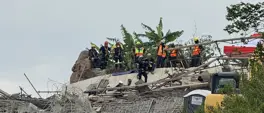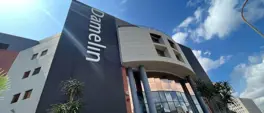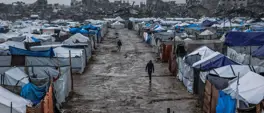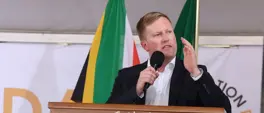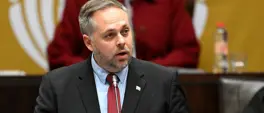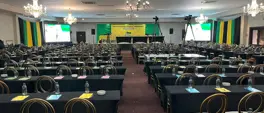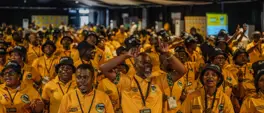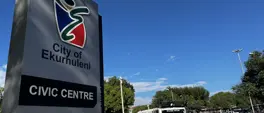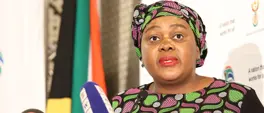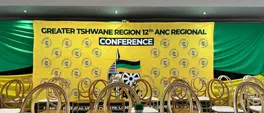SONGEZO ZIBI: It’s time for a South African ‘new deal’
Songezo Zibi
13 May 2024 | 10:56RISE Mzansi’s ‘Plan for a New and Just Economy’includes a R300 billion wealth tax over three years, and a new National Growth Fund, to fix the basics and beyond, writes Songezo Zibi.
Let me not mince words: our economy is in a state of emergency.
We need nothing less than a national crisis plan – our own version of Franklin D. Roosevelt’s New Deal - to fix it. This includes a three-year wealth tax that will inject at least R300 billion into the economy over three years – administered professionally, in a clean and efficient way, by a new national fund.
We all know that our unemployment rate is the highest in the world and rising, up to 41% from 22.9% in 2008. And we all experience the socio-economic problems that arise from this, from hunger to hopelessness and rage; from increasing crime and substance abuse to collapsing families.
Meanwhile, the infrastructure that we need to grow the economy is collapsing too. And our criminal justice system is unable to provide the stability that is the precondition for job-creating business growth. In the last two decades, it is the culture of lawlessness, rather than the benefits of economic growth that have trickled down, from the highest echelons of government to the street.
Our economy is unable to carry most of our citizens, and its ability to do so in the future is rapidly diminishing - particularly given the rate at which the global economy is modernising.
It is simply unsustainable that so many South Africans depend on social grants as their sole source of income. We have become technologically stagnant - still overly dependent on coal, for example, when there is room for dramatic growth in the green economy. We have already been left behind, and risk being even further so.
In the face of this, we need to radically reorient South Africa towards the kind of industrial growth that will put at least three million more South Africans in sustainable jobs by 2029. At RISE Mzansi, we call this ‘new deal’ our ‘Plan for a New and Just Economy’, and we are launching it in Kliptown on Tuesday.
Everyone agrees on what the first step must be. We need to fix the basics. Even the African National Congress (ANC) government accepts this. But it has no plan, let alone capacity, to do anything about it. Cyril Ramaphosa blames Jacob Zuma, forgetting he was sitting in that government too. And no one is fooled by the pre-election load shedding holiday.
As for the rest - our ports and railways, our water supply, our local governments all are in crisis.
Meanwhile, the signatories to the Democratic Alliance (DA)-led alliance tell us they will “rescue” or “fix” South Africa” through better administration. Frankly, that’s not going to do enough, quickly enough. This is because these parties are so tied to tired old “trickle-down” economics that they cannot accept how, in a country like ours’, “growth” and “redistribution” have to go hand-in-hand.
The clearest example of this is the way the DA is determined to throw the baby of “black economic empowerment” out with the bathwater of an ANC government.
Just because the ANC turned BEE into a rent-seeking exercise doesn’t mean it’s the wrong idea. We cannot grow without engaging the majority of the population in employment and enterprise. And any party that believes the free market alone can do this has been a poor student of history.
South Africa needs effective empowerment strategies, land reform, and the unlocking of further state funding to stimulate business and economic growth. Given the demographics of this country, black wealth creation is not a sideshow to our economic development. It is economic development - from the bottom up, and from the middle out.
“Fixing the basics” can’t just be about getting the trains to run on time again, or stopping load shedding, important as these are. What drives RISE Mzansi’s approach is the way we understand the crisis as an opportunity.
With proper planning, “fixing the basics” will actually kickstart the economy by creating sustainable work and opportunities. The clearest example of this is offered by the electricity crisis: we will ensure that households and businesses have access to cheaper, cleaner energy in a way that will create hundreds and thousands of jobs.
And if one side of the equation is about creating job opportunities by investing in infrastructure, the other is ensuring that those entering the labour market have the necessary skills.
We need to overhaul our vocational training system by working with the private sector to integrate on-the-job training into vocational education from Grade 9. This has worked elsewhere, and, if properly administered, will work here too.
At the core of our approach is a simple principle. We will kickstart the economy by mobilising capital that already exists. This will be done primarily by a National Growth Fund, which will be established by levelling a wealth tax of 1.5% on the richest 1% over three years, supplemented by other short-term taxes.
This will raise an estimated R300 billion in three years, and create tens of thousands of jobs, by investing in public infrastructure and increasing development finance to black-owned businesses.
This is viable and necessary, given South Africa’s extraordinary wealth inequality, our jobs crisis, the shortfall in the fiscus, and the need for critical infrastructure investment. We have canvassed this idea, and we are confident that most that most corporations and high-net worth individuals would support it - providing a new government demonstrates the capacity to manage it.
To ensure this, the fund will be established through legislation that ring-fences it against corruption, and ensures it is professionally managed.
Alongside this, we will offer incentives to the private sector in the form of tax rebates, for investments that meet certain economic and development criteria. We will prioritise kickstarting the just energy transition the ANC government has been inexplicably avoiding for too long, primarily by ensuring that every household and small business has access to solar power in the next three years.
We will use such incentives to revitalise our traditional strengths – mining, agriculture, and tourism – and to rehabilitate our existing manufacturing hubs in all the metros, and in former booming areas now falling apart, such as the southern Free State, Gqeberha, and eThekwini.
Even this is not enough, though.
The economy we have today simply cannot create prosperity for the vast majority of South Africans. We need to leverage off our established industries with a history of high performance, so that we can revitalise flagging industries with potential, such as manufacturing and service. This will enable us to invest in high-potential new industries, such as green energy, business processing, and cannabis.
This strategy goes beyond business as usual, and aims to create sustained, job-rich growth above 5.5% on average by 2029, as envisioned by the National Development Plan.
If sustained over time, this will double living standards every 12 to 13 years, creating the basis for us to realise our vision of a prosperous South Africa in one generation, where most people enjoy a middle-class standard of living.
After decades of empty promises, South Africans can be forgiven for raising an eyebrow. But other comparable countries have done it.
We know that South Africa has the natural and human resources to make growth happen again. And we know that the private sector – at home, and offshore – has the capital to invest in this country. What is lacking are two things: a proper industrial plan, and the competence to deliver it.
When these two happen as we know they can, in South Africa, with a new RISE Mzansi-led government, a third ingredient will emerge: trust. There is growth when citizens and investors alike can trust a government to behave reliably and rationally. And there is growth when this government succeeds in bringing people together, in solidarity, and to everyone’s mutual benefit.
This is not misty-eyed “rainbow nation” fantasy. It’s a tried and trusted recipe, albeit elsewhere. Twenty-twenty four is our 1994. It’s time to make it work here, too.
Songezo Zibi is the national leader of RISE Mzansi.
Trending News
More in Opinion

12 December 2025 15:34
CHARLES MATSEKE | The Republic of commissions arrives at its point of no return

12 December 2025 14:15
REBONE TAU | Ekurhuleni needs bold, decisive leaders to reverse years of capture

12 December 2025 05:13
MANDY WIENER | Searching for a superhero with a spine of steel: Why the position of NDPP matters so much


